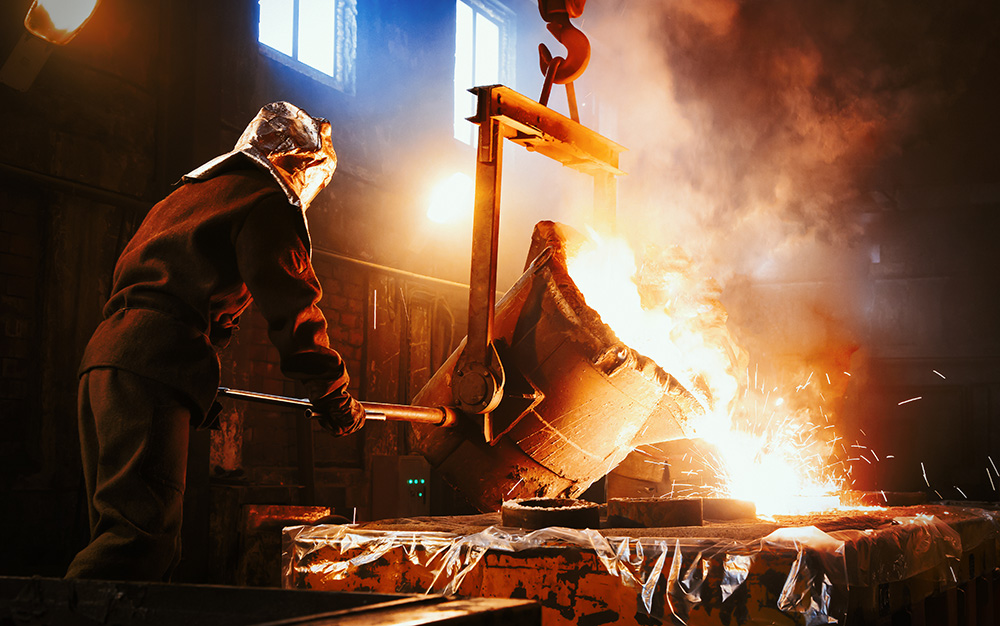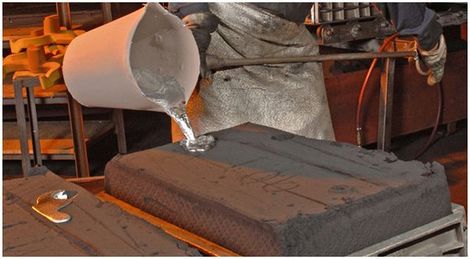How automation and AI are improving the Aluminum Foundry process
Wiki Article
Just How a Metal Foundry Adds to Sustainable Metal Manufacturing Practices
Metal foundries play a crucial function in promoting sustainability within the metal production market. By including recycled materials, they lower reliance on virgin sources and minimize ecological effects. Energy-efficient melting processes better decrease power usage and exhausts. The journey towards lasting methods entails even more than just reusing and power monitoring. It encompasses a more comprehensive commitment to honest sourcing and ingenious modern technologies. The effects of these methods are significant and warrant closer assessment.The Duty of Recycling in Metal Foundries
While metal production has actually generally counted on virgin products, the enhancing emphasis on sustainability has actually resulted in a significant shift in methods, specifically in metal foundries. Recycling has actually emerged as an important element of this makeover, permitting foundries to repurpose scrap metal and lower reliance on mined sources. By incorporating recycled materials right into their procedures, foundries not just reduce environmental effect yet additionally lower production costs.Using recycled steels, such as copper, steel, and light weight aluminum, reduces energy intake and decreases greenhouse gas emissions linked with traditional mining and refining approaches. Foundries can achieve top quality outcomes by using advanced sorting and handling innovations to guarantee the purity of recycled materials. This focus on recycling fosters a circular economy, where waste is minimized, and resources are utilized effectively. As a result, metal foundries play a critical function in promoting lasting practices within the metal production market.
Energy-Efficient Melting Methods
Energy-efficient melting strategies are crucial for boosting sustainability in metal production. These methods considerably lower energy consumption during the melting process, which is just one of the most energy-intensive phases in metal production. Technologies such as induction melting, resistance home heating, and microwave melting deal enhanced efficiency contrasted to traditional approaches. Induction melting, for example, uses magnetic fields to generate warm straight within the metal, lessening power loss and offering exact temperature control.Furthermore, implementing heat healing systems can additionally boost efficiency by recycling and recording waste warmth generated throughout melting. Employing advanced insulation materials and maximizing heating system layouts additionally add to power cost savings. By taking on these cutting-edge melting strategies, metal foundries can lower their carbon footprint, decrease functional costs, and add to an extra lasting manufacturing landscape. The assimilation of energy-efficient techniques not only aligns with environmental objectives yet additionally fulfills the expanding demand for accountable production approaches in the metal market.
Lasting Sourcing of Raw Products
Lasting sourcing of resources is vital for decreasing the ecological effect of metal production. This includes the enhanced usage of recycled metals, the fostering of ethical mining techniques, and efforts targeted at regional sourcing. By prioritizing these methods, the industry can advertise responsible resource monitoring and support neighborhood economic climates.
Recycled Metal Utilization
How can markets properly reduce their environmental effect while satisfying the expanding need for metal? One significant method is the use of recycled metal. By including scrap metal into their manufacturing processes, foundries can decrease the extraction of virgin materials, consequently preserving natural resources and decreasing energy consumption. Recycled metals need less power to procedure contrasted to their raw equivalents, leading to lower greenhouse gas emissions. Additionally, using recycled metal assists divert waste from garbage dumps, advertising a round economic climate. Industries that focus on recycled metal not just add to sustainability but also benefit from cost savings connected with minimized product purchase. Consequently, recycled metal utilization stands as a necessary approach for eco liable metal manufacturing.Ethical Mining Practices
While the demand for steels proceeds to increase, markets are progressively acknowledging the value of honest mining techniques in making certain accountable sourcing of basic materials. Honest mining includes a commitment to environmental stewardship, social duty, and adherence to reasonable labor methods. Business are now prioritizing partnerships with mines that demonstrate openness in their procedures, lessening environmental impact and respecting neighborhood areas. This technique not just cultivates a lasting supply chain however likewise improves the track record of services involved. By implementing strenuous standards and qualifications, industries can battle illegal mining tasks and promote the well-being of employees. Eventually, moral mining practices add significantly to a more sustainable metal manufacturing environment, aligning financial development with social and ecological integrity.Local Sourcing Efforts

Developments in Metal Casting Processes
Innovations in metal casting procedures are changing the industry by including sophisticated recycling techniques that decrease waste. Energy-efficient melting techniques are also being created to minimize energy intake during production. Furthermore, using cutting-edge mold and mildew materials adds to enhanced efficiency and sustainability in casting operations.Advanced Recycling Techniques
Advanced recycling methods are transforming metal casting procedures, significantly enhancing sustainability in the sector. These advancements concentrate on reprocessing and redeeming scrap metal, significantly reducing waste and the requirement for virgin products. Methods such as hydrometallurgy and pyrometallurgy make it possible for foundries to extract useful steels from utilized parts, guaranteeing effective source application. Furthermore, progressed sorting and purification modern technologies enhance the quality of recycled metals, making them appropriate for high-performance applications. This not only decreases the environmental footprint of metal production but likewise promotes a circular economy by promoting the reuse of products. As these reusing methods proceed to advance, they promise to even more enhance procedures within foundries and add to a more sustainable metal manufacturing landscape.Energy-Efficient Melting Approaches
While traditional melting approaches have actually long been the foundation of metal casting, recent developments have actually presented energy-efficient strategies that noticeably reduce energy consumption and emissions. Technologies such as induction melting and electric arc heating systems have actually acquired prestige, enabling exact control over temperature level and lowering the need for fossil gas. These approaches not just boost power effectiveness however likewise promote faster melting times, which translates to lower functional prices. Furthermore, advancements in warmth recovery systems enable foundries to capture and reuse excess heat generated during the melting procedure. This holistic approach to power monitoring not just sustains lasting methods yet additionally placements metal foundries as leaders in the change in the direction of greener production procedures, even more lining up with worldwide sustainability goals.Innovative Mold Products
As the need for more sustainable and efficient metal casting procedures expands, the exploration of innovative mold and mildew products has actually ended up being a focal point in the industry. Traditional mold and mildew products typically contribute to environmental obstacles, triggering the search for alternatives that lower waste and power usage. Recent innovations consist of the advancement of naturally degradable binders and recyclable composites, which not just enhance mold and mildew efficiency but additionally lessen environmental impact. In addition, using 3D printing technology in mold and mildew creation permits complex designs that reduce product usage and enable quick prototyping. These ingenious materials not just improve casting accuracy yet likewise straighten with sustainability objectives, showcasing the market's dedication to reducing its carbon impact while maintaining high-grade production criteria.Decreasing Waste Via Advanced Technology
Innovative technologies are transforming the metal production industry by significantly decreasing waste and improving effectiveness. Advanced data analytics and maker discovering formulas make it possible for foundries to maximize production processes, lessening and recognizing inefficiencies scrap material. Smart sensing units check devices efficiency in real-time, allowing for predictive upkeep that lowers downtime and waste generation. In addition, additive production techniques, such as 3D printing, enable the production of facility components with minimal product usage, markedly reducing waste compared to conventional techniques.
Additionally, closed-loop systems are ending up being much more common, wherein scrap metal and byproducts are reused back into the manufacturing cycle, making sure that materials are utilized to their greatest capacity - Aluminum Foundry. This combination of modern technology not only promotes resource preservation but additionally enhances the general sustainability of metal production practices. By embracing these advancements, foundries can add to an extra sustainable future while preserving competitiveness on the market
The Impact of Foundries on Carbon Footprint Decrease
Foundries play an important function in reducing the carbon footprint of the metal manufacturing market by executing numerous sustainable techniques. By using energy-efficient modern technologies, such as electrical arc heaters, these facilities considerably reduced greenhouse gas emissions contrasted to conventional approaches. In addition, foundries significantly embrace renewable resource sources, which additionally decreases their reliance on nonrenewable fuel sources.Reusing scrap metal is another vital practice that foundries utilize, conserving sources and reducing the requirement for virgin materials. This not only lessens waste but additionally minimizes the energy-intensive extraction processes connected with mining. The fostering of closed-loop water systems aids to lessen water use and decrease wastewater discharge, adding to an extra lasting procedure.
With these efforts, foundries show their commitment to ecological stewardship, leading to a significant decrease in the total carbon footprint of the metal production sector. Their continuous initiatives are pivotal in the shift towards an extra sustainable commercial landscape.
Often Asked Questions
What Kinds of Metals Are Many Typically Recycled in Foundries?
Light weight aluminum, brass, steel, and copper are amongst one of the most commonly recycled metals in foundries. These metals are preferred due to their high recycling prices, economic value, and extensive availability, contributing substantially to commercial sustainability initiatives.Just How Do Foundries Guarantee the Quality of Recycled Products?
Foundries determine the high quality of recycled products with rigorous screening, sorting, and purification processes. They apply innovative innovations to assess composition and eliminate contaminations, ensuring that the recycled steels meet industry requirements for efficiency and security.
What Certifications Exist for Lasting Foundry Practices?
Different qualifications exist for lasting foundry methods, including ISO 14001 for ecological monitoring, ISO 50001 for energy management, and LEED accreditation for sustainable building practices (Aluminum Casting). These accreditations assist assure adherence to ecological and sustainability criteria in operationsHow Do Foundries Gauge Their Carbon Impact Decrease?
Foundries determine carbon impact decrease via devices like lifecycle assessments, power audits, and discharges tracking systems. They contrast standard discharges to present outcomes, reviewing improvements in power performance, material use, and renewable energy adoption with time.What Are the Economic Benefits of Sustainable Metal Production?
Lasting metal production offers economic advantages such as reduced functional costs, increased effectiveness, improved market competition, and possible government incentives. Furthermore, it promotes innovation and draws in ecologically aware customers, eventually driving lasting earnings for businesses.Metal foundries play a crucial duty in advertising sustainability within Aluminum Foundry the metal manufacturing sector. While metal production has traditionally depended on virgin materials, the boosting emphasis on sustainability has actually led to a substantial change in practices, specifically in metal foundries. By integrating scrap metal into their production processes, foundries can decrease the extraction of virgin materials, consequently preserving all-natural sources and decreasing power consumption. Foundries play a crucial function in lowering the carbon impact of the metal production market by applying numerous lasting methods. Recycling scrap metal is one more important method that foundries utilize, saving resources and minimizing the demand for virgin materials.
Report this wiki page